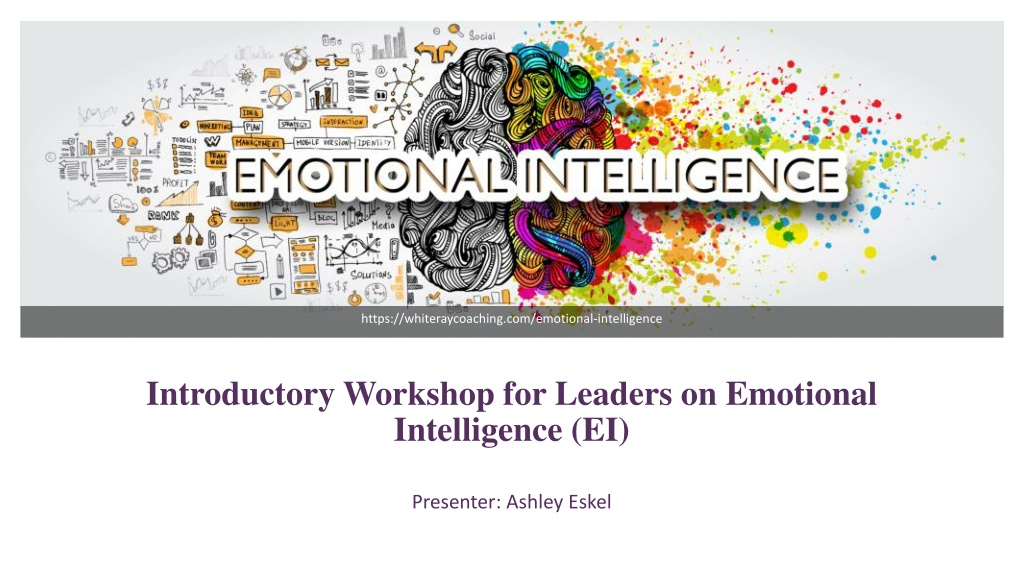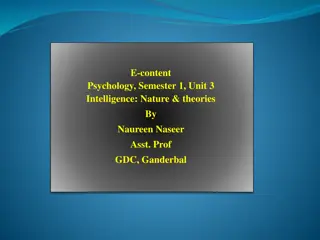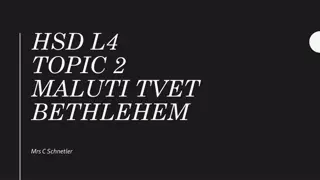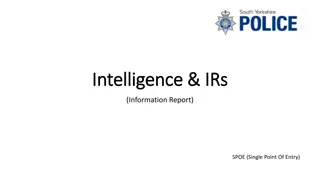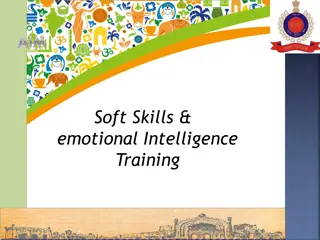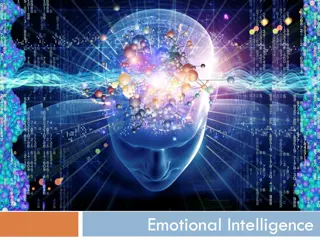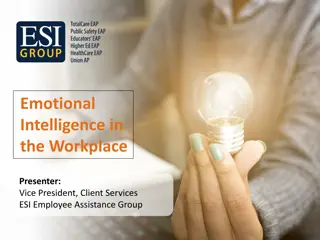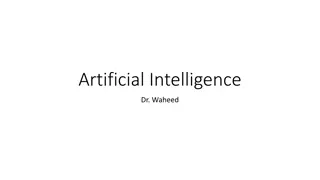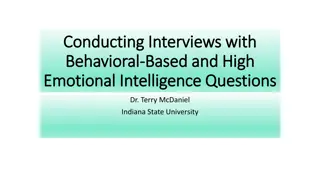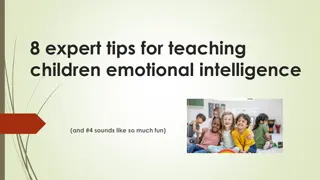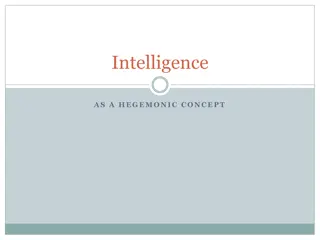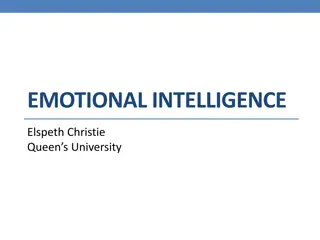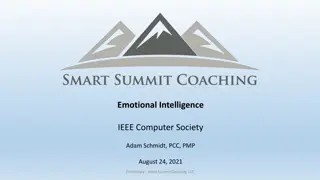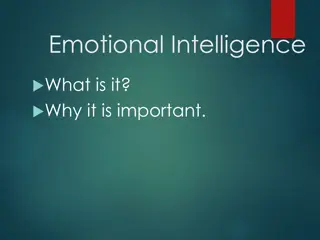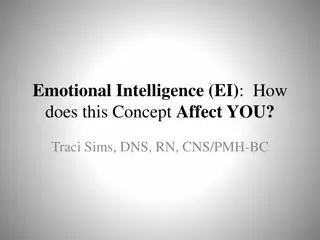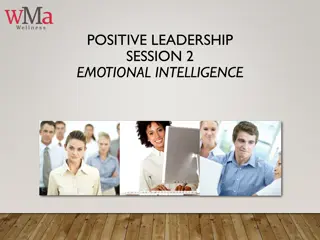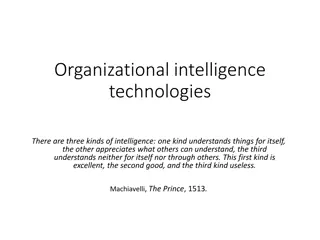Understanding Emotional Intelligence: A Guide for Leaders
Explore the essential concepts of Emotional Intelligence (EI) and its importance for leaders. Delve into defining EI, Sir John Whitmore's perspective, Goleman's model, and the domains of self-awareness, self-management, social awareness, and relationship management. Gain insights into the role of EI in leadership effectiveness and fostering positive workplace relationships.
Download Presentation

Please find below an Image/Link to download the presentation.
The content on the website is provided AS IS for your information and personal use only. It may not be sold, licensed, or shared on other websites without obtaining consent from the author. Download presentation by click this link. If you encounter any issues during the download, it is possible that the publisher has removed the file from their server.
E N D
Presentation Transcript
https://whiteraycoaching.com/emotional-intelligence Introductory Workshop for Leaders on Emotional Intelligence (EI) Presenter: Ashley Eskel
I am so excited youve chosen to join our first workshop on Emotional Intelligence! While we wait for others to join, please complete the following: 1. Find the chat function on the bottom of the Webex. Using the chat, let us know who you are, what your role is with our organization, and what you know about emotional intelligence. Welcome! 2. If you don t yet know anything about EI, don t worry! That s why we are here!
Defining Emotional Intelligence Why Train Leaders in Emotional Intelligence? EI Tools Already in Practice Agenda Implications to Consider Next Steps References and Resources for Continued Education
According to Sir John Whitmore, emotional intelligence can be described as interpersonal intelligence or, even more simply, as personal and social skills. Goleman and others have defined many competencies, including self- confidence, empathy, adaptability, and being a change catalyst, which can be grouped neatly into four domains: self-awareness, self-management, social awareness, and relationship management. That sounds straightforward enough and all of us combine these skills to some degree (2017, p. 41). Defining Emotional Intelligence (EI) Emotional intelligence is "the ability to perceive and express emotions, to assimilate emotion in thought, to understand and judge with the help of emotions and to regulate one s own emotions and others (Hahn, 2012, p. 745).
Golemans Model Self-Awareness: involves understanding one s own emotions, strengths, weaknesses and drives and being able to identify these within oneself. Self-Management: means not only having an awareness of one s emotions and traits but being able to grasp and control those urges as well.
Golemans Model Social Awareness: considered the ability to recognize and understand the emotions of other people, which is essentially thoughtfully considering the feelings of another, a concept more commonly referred to as empathy. Relationship Management: relates to managing relationships within the workplace, by establishing appropriate social skills and recognizing that every member of a team can be a positive contributor if a leader takes the time to understand each person
Why Train Leaders in EI?
Why Train Leaders in EI? Studies show that EI is a better predictor of life success than IQ IQ gets you hired, but EQ gets you promoted. Research has proven that group decision making is superior to one individual s mindset Collective EI is what sets high-performing teams apart from average performing teams, according to Goldman (2002, p. 58).
To change the application to a determination of emotional intelligence would be little to no disruption to current practices where these tools are already in use. Commonly used tools: Myers Briggs, 16PF, and BarOn Eq-1 EI Tools Already in Practice Mindfulness: can help leaders develop their self-awareness, which will in turn help them understand how they fit into organizational culture and how they can create a more balanced leadership style and develop greater self-regulation (Kaoun, 2019, p. 205).
In Adam Grants (2014) article, The Dark Side of Emotional Intelligence, he explores the idea that in some jobs, being in touch with emotions is essential. In others, it seems to be a detriment. And like any skill, being able to read people can be used for good or evil. Implications to Consider People who use their leadership roles solely to gain formal or informal power are not displaying leadership at all. Rather, they are using their EI to grasp what people want and to pander to those desires to gain personal authority and influence (Hicks, 2008, p. 18.)
Whats Next? Utilize one of the mentioned personality tools to determine how emotionally intelligent you may be. Consider how to incorporate skill building of EI into your current work atmosphere. Work with your manager to create an action plan in order to develop these skills further Stay tuned for additional workshops on developing EI for application in the workspace.
References Baesu, C. (2018). Leadership Based on Emotional Intelligence in Modern Organizations. USV Annals of Economics and Public Administration, 18(2(28)), 73 78. Bloom, L. (2011). The Cost and Benefits of Emotional Honesty. Psychology Today. https://www.psychologytoday.com/us/blog/stronger-the-broken-places/201112/the-cost-and-benefits-emotional- honesty. Goleman, D., Boyatzis, R., & McKee, A. (2002). The Emotional Reality of Teams. Journal of Organizational Excellence, 21(2), 55 65. doi: 10.1002/npr.10020. Grant, Adam. (2014). The Dark Side of Emotional Intelligence. The Atlantic. https://www.theatlantic.com/health/archive/2014/01/the-dark-side-of-emotional-intelligence/282720. Hahn, R.-F., Sabou, S., Toader, R.-M., & R dulescu, C. M. (2012). About Emotional Intelligence and Leadership.Annals of the University of Oradea, Economic Science Series, 21(2), 744 749.
Hicks, R., & Dess, G. G. (2008). A question of leadership: Are there any potential downsides to emotional intelligence for executives, and if so, what are they? Leadership in Action, 28(5), 18 24. doi: 10.1002/lia.1264 Kaoun, T. M. (2019). Enhancing Leaders Emotional Intelligence: Why Mindfulness? Journal of Leadership Education, 18(1), 200 212. doi:10.12806/V18/I1/T2 Levi, D. (2017). Group Dynamics for Teams (5th ed.). Thousand Oaks, California: SAGE Publications. Macaleer, W. D., & Shannon, J. B. (2002). Emotional Intelligence: How Does it Affect Leadership? Employment Relations Today (Wiley), 29(3), 9 19. doi:10.1002/ert.10047 Raelin, J. A. (2003). Creating leaderful organizations: How to bring out leadership in everyone. San Francisco: Berrett-Koehler. Venera, T. A. (2019). Leadership and Emotional Intelligence. Analele Universit ii Constantin Br ncu i Din T rgu Jiu : Seria Economie, 6, 160 166. Warrick, D. D. (2019). Leadership Illusions: Important Implications for Leaders and Training and Coaching Leaders. Organization Development Review, 51(2), 6 13. Whitmore, J. (2017). Coaching for Performance (5th ed.). Boston, MA: Nicholas Brealey Publishing. Yadav, R., & Lata, P. (2019). Role of Emotional Intelligence in Effective Leadership. International Journal on Leadership, 7(2), 27 32.
